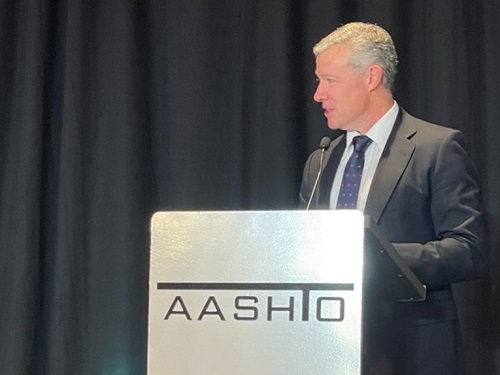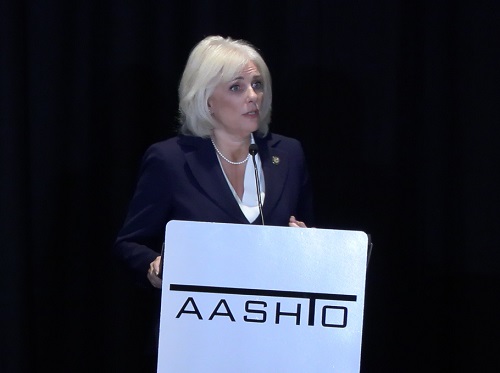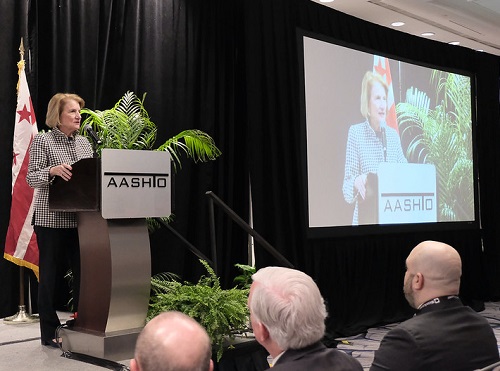Four key Congressional leaders outlined some of their current and future transportation focus areas at the 2024 Washington Briefing held by the American Association of State Highway and Transportation Officials in Washington, D.C.
[Above photo by AASHTO]
Sen. Shelley Moore Capito (R-WV) – ranking member on the Senate Committee on Environment and Public Works – emphasized that the funding from the Infrastructure Investment and Jobs Act or IIJA is helping deliver “amazing” success.
“We are seeing great progress at the state level,” she said in her remarks. “We worked hard to compromise so we had a robust [bill] that satisfied our transportation infrastructure needs, preserving as much formula funding as we could. And we ended up voting it out of committee unanimously – I really think that indicates it is good policy.”
That being said, Sen. Capito said she hopes to spur similar progress on the implementation of One Federal Decision reforms to help speed up project delivery timelines.
“We thought implementation of One Federal Decision would be a ‘panacea of greatness’ but it is not panning out that way,” she said. “It is rolling out slower and has been a bit of a disappointment. We need to make sure we get that right.”
Sen. Capito added that she is also aware of issues with the slow disbursements from discretionary grant programs created by the IIJA, but hopes to work that out as work begins on the next surface transportation reauthorization package. “We need to look at what is working and what is not with those discretionary grant programs.”
Sen. Tom Carper (D-DE), chair of the EPW committee, described the IIJA as “one of the most meaningful legislative packages we’ve passed in our lifetime” and stressed that such “bipartisan solutions are lasting solutions” when it comes to infrastructure investment.
Sen. Carper – who is retiring from Congress following the end of his term in 2024 – also noted that progress will continue to be made on upgrading the nation’s transportation system despite the pressures of inflation, material shortages, and workforce scarcity.
“There is much we can complain about around our country and the world – but in adversity there lies great opportunity and there is great opportunity here,” he said. “Can we do better? Sure we can do better. The best days for our country lie ahead.”
However, Rep. Sam Graves (R-MO), chair of the House of Representatives Committee on Transportation and Infrastructure, cautioned that the sheer funding amount of the IIJA at $1.2 trillion requires continued careful oversight by Congress.
“The amount of money we are pushing out opens up opportunities for abuse in the process; we’re working to keep that to a minimum,” he said.
Rep. Rick Larsen (D-WA), ranking member of the House T&I committee, stressed to state departments of transportation attending the briefing that they must communicate the value of what the IIJA is providing in terms of funding to their respective Congressional delegations.
“You really need to talk about it now with your members of Congress, whether or not they voted for it,” he said. “If want this kind of funding again, you need to communicate with your members of Congress what these funds are doing – this is a victory, and you need to put the meat on the bones. Because state DOTs have great power to shape the transformation of transportation over the next several years.”
Like Sen. Carper , Sen. Capito, and Rep. Graves, Rep. Larsen praised the bipartisanship nature of past and present transportation infrastructure work going on in Congress.
“We are getting socialized to the idea that we are going to do this again,” he explained. “In this committee, we’ve been pretty bipartisan – and though next year it will be a new Congress, we want that to continue – we want to be and island of partnership in sea of partisanship.”
 Top Stories
Top Stories
State DOTs Call for Action at 2nd Annual Safety Summit
October 18, 2024 Top Stories
Top Stories

